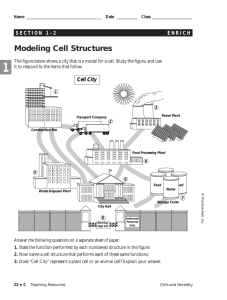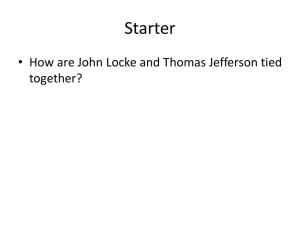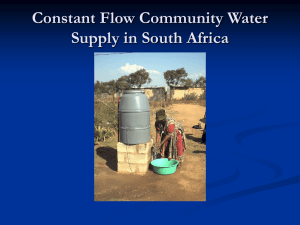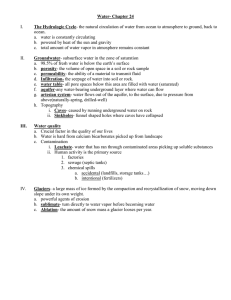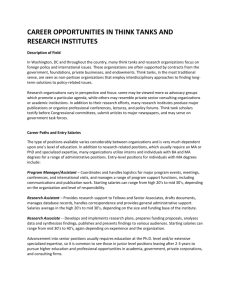O
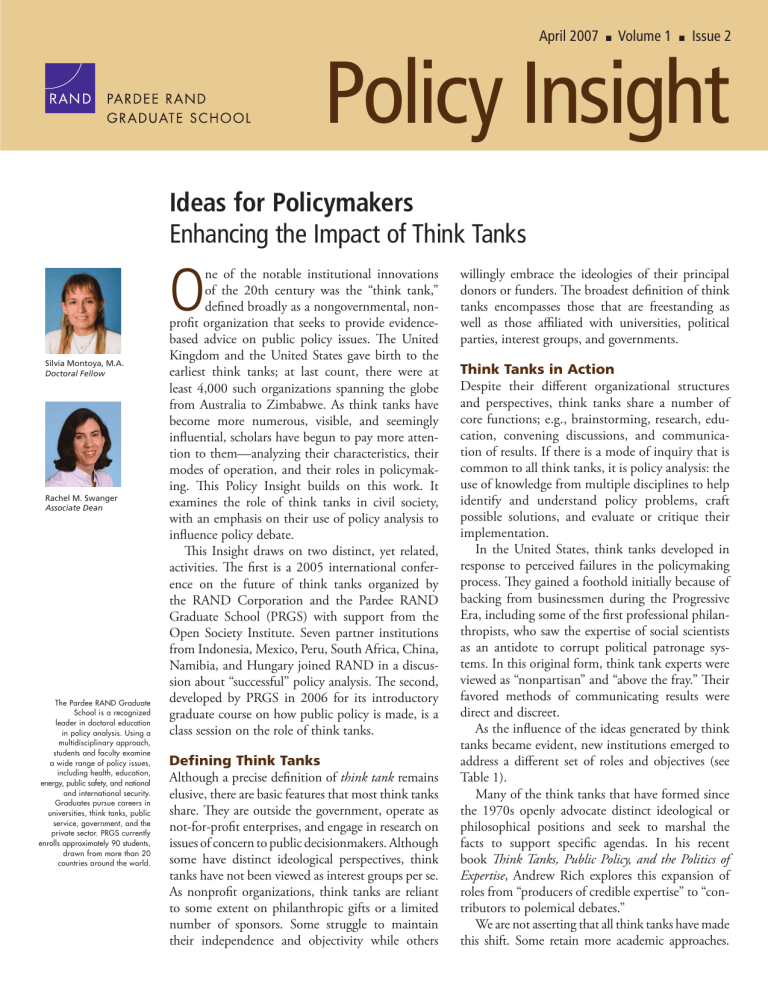
O
Volume 1
O
Issue 2 April 2007
Policy Insight
Silvia Montoya, M.A.
Doctoral Fellow
Rachel M. Swanger
Associate Dean
The Pardee RAND Graduate
School is a recognized leader in doctoral education in policy analysis. Using a multidisciplinary approach, students and faculty examine a wide range of policy issues, including health, education, energy, public safety, and national and international security.
Graduates pursue careers in universities, think tanks, public service, government, and the private sector. PRGS currently enrolls approximately 90 students, drawn from more than 20 countries around the world.
Ideas for Policymakers
Enhancing the Impact of Think Tanks
O ne of the notable institutional innovations of the 20th century was the “think tank,” defined broadly as a nongovernmental, nonprofit organization that seeks to provide evidencebased advice on public policy issues. The United
Kingdom and the United States gave birth to the earliest think tanks; at last count, there were at least 4,000 such organizations spanning the globe from Australia to Zimbabwe. As think tanks have become more numerous, visible, and seemingly influential, scholars have begun to pay more attention to them—analyzing their characteristics, their modes of operation, and their roles in policymaking. This Policy Insight builds on this work. It examines the role of think tanks in civil society, with an emphasis on their use of policy analysis to influence policy debate.
This Insight draws on two distinct, yet related, activities. The first is a 2005 international conference on the future of think tanks organized by the RAND Corporation and the Pardee RAND
Graduate School (PRGS) with support from the
Open Society Institute. Seven partner institutions from Indonesia, Mexico, Peru, South Africa, China,
Namibia, and Hungary joined RAND in a discussion about “successful” policy analysis. The second, developed by PRGS in 2006 for its introductory graduate course on how public policy is made, is a class session on the role of think tanks.
Defining Think Tanks
Although a precise definition of think tank remains elusive, there are basic features that most think tanks share. They are outside the government, operate as not-for-profit enterprises, and engage in research on issues of concern to public decisionmakers. Although some have distinct ideological perspectives, think tanks have not been viewed as interest groups per se.
As nonprofit organizations, think tanks are reliant to some extent on philanthropic gifts or a limited number of sponsors. Some struggle to maintain their independence and objectivity while others willingly embrace the ideologies of their principal donors or funders. The broadest definition of think tanks encompasses those that are freestanding as well as those affiliated with universities, political parties, interest groups, and governments.
Think Tanks in Action
Despite their different organizational structures and perspectives, think tanks share a number of core functions; e.g., brainstorming, research, education, convening discussions, and communication of results. If there is a mode of inquiry that is common to all think tanks, it is policy analysis: the use of knowledge from multiple disciplines to help identify and understand policy problems, craft possible solutions, and evaluate or critique their implementation.
In the United States, think tanks developed in response to perceived failures in the policymaking process. They gained a foothold initially because of backing from businessmen during the Progressive
Era, including some of the first professional philanthropists, who saw the expertise of social scientists as an antidote to corrupt political patronage systems. In this original form, think tank experts were viewed as “nonpartisan” and “above the fray.” Their favored methods of communicating results were direct and discreet.
As the influence of the ideas generated by think tanks became evident, new institutions emerged to address a different set of roles and objectives (see
Table 1).
Many of the think tanks that have formed since the 1970s openly advocate distinct ideological or philosophical positions and seek to marshal the facts to support specific agendas. In his recent book Think Tanks, Public Policy, and the Politics of
Expertise , Andrew Rich explores this expansion of roles from “producers of credible expertise” to “contributors to polemical debates.”
We are not asserting that all think tanks have made this shift. Some retain more academic approaches.
Institution
The Brookings
Institution
American Enterprise
Institute
Center for Strategic and International
Studies
The Heritage
Foundation
Center for American
Progress
Date
Table 1. Select U.S. Think Tanks
Key Original Role
1916 Assist the president and executive agencies with modern administrative practices
1943 Help legislators and their small staffs cope with complex and technical issues
1962 Facilitate the flow of information between the Executive and Legislative Branches
1973 Inject conservative ideas back into the policy debate
Core Supporters
Progressive Era businessmen, philanthropists
Business leaders
Foreign policy elites
Republican Party elites
2003 Develop a long-term progressive vision for America
Democratic Party elites
Ideological Perspective
Use scientific approaches to improve government
Ensure free-market voices are heard by policymakers
Address international security through bipartisan solutions
Build an America where freedom, opportunity, prosperity, and civil society flourish
Build an America with an open, effective government that champions the common good
2
Others nurture privileged relationships with their original sponsors. Some function more as conveners of discussions among policy elites; others are unabashedly in the business of policy advocacy.
Most think tanks set as a goal influencing the formation of public decisionmaking, but their points of entry vary. Some view their principal mission as engaging directly with deci-
Think Tanks in Action:
Possible Roles sionmakers. Others place more focus on affecting the media, influential stake-
Identify problems holders, and opinion leaders. The meth-
Highlight issues ods employed to reach their audience
Suggest proposals
Evaluate policies
Participate in public debates
Mediate between positions and interests have evolved over time, as have the products they use to communicate. Where books, journal articles, congressional testimony, op-eds, and conference papers once predominated, blogs and Web sites full of ideas, contacts, and databases are now the norm.
From American Anomaly to Global Trend
Think tanks have flourished in the United States in large part due to unique features of our political system, specifically the division of power between the Executive and Legislative Branches as equal and competing sources of political ideas. Lack of policymaking expertise within the major political parties has also fostered the development of think tanks, as has an extensive, wealthy, and supportive philanthropic community.
James A. Smith argues that in countries with parliamentary systems and well-developed civil services, the need for independent outside policy experts is considerably curtailed. He questions whether think tanks as an institution can be transplanted into other political cultures. Yet research institutions that fulfill many of the functions outlined above have begun emerging in societies throughout the world.
Their development in Russia, Central and Eastern
Europe, and China, as well as in many African and
Asian nations, has been driven by some of the same perceived needs that gave rise to the first U.S. think tanks. As such, their emergence is seen by some observers as a harbinger of democratic change.
Measuring the Impact and Efficacy of Think Tanks
The proliferation of think tanks is some indication of their value, but is in itself insufficient evidence of their impact or efficacy. Scholars have struggled to devise effective measures of success.
Public outreach activities—such as opinion pieces in newspapers, staff appearances on TV interview programs, and invitations to testify before
Congress—can be easily enumerated. But these measures of activity do not necessarily translate into impact if one defines impact as the adoption or modification of a specific policy.
The influence of policy research can be subtle, indirect, and inadvertent. And it can exert impact at multiple points in the policy process, perhaps only after a gradual period of deliberation by stakeholders and policymakers. So instead of looking for numbers of measurable activities, we took a different tack.
The Linking Think Tanks conference at RAND asked each participating organization to identify a successful case of policy research. The definition of “success” was left up to the individual teams. In addition, we asked RAND researchers and other scholars of public policy for illustrations of policy research in the United States that made a difference.
The results of these two inquiries are summarized in
Table 2.
Success can be defined in a number of ways.
Table 2. Some Influential Cases of Policy Analysis
Country
United
States
United
States
United
States
United
States
United
States
China
Peru
Topic
Welfare policy
Welfare policy
Traffic crashes
Health insurance
Pollution prevention Market-based
Economic inequality
Food assistance
Namibia Trade flows
Issue
Welfare and work effort
Government subsidies
Minimum drinking age laws
Coverage and overuse of medical services instruments
Regional disparities
Free milk leakages
Regionalism in all 50 states
Outcome
Earned Income Tax Credit
Personal Responsibility and Work
Opportunity Reconciliation Act
Raised drinking age to 21
Introduction of co-payments and deductibles
Cap-and-trade programs
Regional development policies
Better targeting to needy children Group for the Analysis of Development
Opted out of new trade agreement
Organization
Institute for Research on Poverty/
University of Wisconsin
Manhattan Institute for Policy Research
Insurance Institute for Highway Safety
RAND Corporation
Resources for the Future
Tsinghua University
Namibian Economic Policy Research Unit
Most of the cases of policy analysis cited in Table 2 ultimately resulted in a change in government policy. But with regard to these examples, other contributing factors must be given their due; these include placing problems on the agenda of policymakers; raising the level and quality of debate; finding effective communication strategies; and establishing close relationships with sponsors, stakeholders, and/or policymakers without being unduly influenced by them.
Think tanks are widely acknowledged for helping to place problems on the agenda of policymakers.
Through their expertise and freedom to express ideas, think tanks identify problems or make it more difficult for policymakers to ignore existing ones.
Conference participants stressed that raising the level or quality of debate—by motivating more evidence-based deliberation about policy—has a significant impact. Even by adding a single word or concept into a public debate, such as poverty , sustainability , or freedom , think tanks can change how policy issues are framed, how they are discussed, and what is considered to be common knowledge or common sense. And, in theory, a better-quality debate hinders those public figures who would take stances based on oversimplified assertions, groundless factual claims, or empty political rhetoric. This influence, however, is highly contingent on the ability of think tanks to achieve widespread dissemination of their ideas and findings in a convincing manner.
Think tanks also play a valuable role by acting as a filter for bad proposals or ideas that have not been given adequate thought or consideration.
Consequently, the most telling sign of a success in policy research may be the decline or disappearance of flawed or premature proposals from active consideration. Of course, think tanks do not always get it right. Instances can be found where they quashed ideas with significant merit, promoted policies of dubious quality, or neglected to forcefully point out flaws in a policy under debate.
Think tanks have learned that technical quality alone will not ensure that the appropriate audiences will pay attention. Effective dissemination is also a key determinant of success. The same ideas communicated at different times or in different ways may elicit a range of reactions, from indifference to enthusiasm. The likelihood of success can be increased by thoughtful communications strategies where the message is tailored for the audience. For example, the success in changing the Glass of Milk
Program in Peru was credited to a dissemination strategy that used different channels for different target audiences.
The best think tanks are nimble and can seize
“windows of opportunity” when findings from policy research have a particularly significant chance for policy impact. Conference participants cited examples where complementary conditions in the political environment magnified the impact of policy analysis—e.g., cases where a prominent subject had already been identified as a concern for research (e.g., natural gas pricing in Mexico, or
U.S. drug policy), where involvement of a preeminent social institution ensured consideration (e.g.,
Namibia’s participation in the Common Market for
Eastern and Southern Africa), where a new research approach stimulated deliberation (e.g., the Quarterly
Economic Indicators in Moldova and Kazakhstan), and where a new subject for policy research and action drew attention (e.g., regional disparities in
China or vulnerability to poverty in Indonesia).
Establishing relationships with sponsors, stakeholders, and decisionmakers is crucial. It is equally important for think tanks to build relationships with media professionals, both to establish credibility
Through their expertise and freedom to express ideas, think tanks identify problems or make it more difficult for policymakers to ignore existing ones.
3
and to cultivate sensitivity about how the work of the think tank is portrayed.
A close relationship between researchers and stakeholders, as in the case of regional disparities in
China, has numerous advantages: the ability to generate more accurate and up-to-date findings, access to new sources of expertise on the subject, better understanding of the policy problem, the capacity to create a long-term research agenda, and connections to channels that can maximize the impact of their work. However, this ideal of close and enduring relationships with stakeholders may be difficult to achieve in many countries because of frequent shifts in the direction of policymaking institutions and changes in political leadership.
Think tanks must strive to find the right balance between two objectives: building a close relationship with stakeholders for the purpose of enhancing the relevance and timeliness of research, and maintaining adequate independence to preserve the integrity (real and perceived) of the research.
We believe there is much to learn from these interim indicators of success as they all can contribute to one of the most valuable long-term benefits of think tanks: the strengthening of the political voice of educated sectors of society—one of the necessary components of a healthy civil society in both emerging and advanced democracies.
Further Reading
Directions for the Future
As think tanks continue to spring up around the world, they still have much to do to improve policy impact. The Overseas Institute for Development has identified three “truths” that it argues are highly correlated with impact on policy decisionmaking and design. (1) Policy research is carried out in a specific political and policymaking process. (2)
Whether an idea gets attention from the public is closely related to the research and ideas proposed
(“the product”) as well as the think tank’s credibility and the way the idea is presented. (3) One must build the links that can help ideas to be legitimated and to effectively influence policy. As think tanks do a better job of staying in touch with the dynamics of policy issues, they find greater appreciation for the work they do and a growing demand for their services.
Think tanks throughout the world face some common challenges, creating incentive to “link” think tanks with each other. This need is particularly acute for the developing world, where unstable political environments challenge survival. Such links can lead to more innovative and cost-effective research. Researcher exchanges could strengthen the fragile bridges that currently exist. A periodic international meeting of think tank leaders would help those in the think tank community learn from each other. But the vast improvement in communications technology is already linking think tanks on a daily basis, allowing collaboration that is far more meaningful than could be established through traditional means.
Peer Reviewers
Andrew Rich
Associate Professor of Political Science,
The City College of New York
John Mendeloff
Director, RAND Center for Health and Safety in the Workplace;
Professor of Public
Management and Policy,
University of Pittsburgh
Graduate School of Public and International Affairs
Global Development Network, “Bridging Research and
Policy.” As of April 3, 2007: http://www.gdnet.org/rapnet
McGann, James G., with Erik C. Johnson, Comparative Think
Tanks, Politics and Public Policy , New York: Edward Elgar
Publishing, 2005.
Rich, Andrew, Think Tanks, Public Policy, and the Politics of
Expertise , New York: Cambridge University Press, 2004.
Smith, James A., “The Culture of American Think Tanks,”
Kennan Institute for Advanced Russian Studies, Occasional
Paper No. 256 , Washington, D.C.: The Woodrow Wilson
Center for Scholars, 1994, pp. 1–10.
Start, Daniel, and Ingie Hovland, Tools for Policy Impact: A
Handbook for Researchers , London: Overseas Development
Institute, 2004. As of April 3, 2007: http://www.odi.org.uk/
Rapid/Publications/Documents/Tools_handbook_final_web.pdf
Stone, Diana, and Andrew Denham (eds.), Think Tank
Traditions: Policy Research and the Politics of Ideas , Manchester,
UK: Manchester University Press, 2004.
http://www.prgs.edu/ RAND publications are available at www.rand.org
The RAND Corporation is a nonprofit research organization providing objective analysis and effective solutions that address the challenges facing the public and private sectors around the world. RAND’s publications do not necessarily reflect the opinions of its research clients and sponsors.
R
® is a registered trademark. © RAND 2007
CP-521 (4/07)

